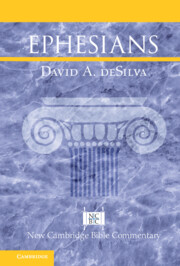III. - Commentary on Ephesians
Published online by Cambridge University Press: 21 April 2022
Summary
Letters in the Greco-Roman world tended to open in a formulaic way identifying the author and recipient and adding a word of greeting. The letter accompanying Paul from Jerusalem to the garrison in Caesarea offers a fine example of the typical, terse formula: “Claudius Lysias, To His Excellency, Governor Felix: Greetings.” It served in the most verbally economical way possible to bridge the distance between a speaker and hearer that necessitated the writing of a letter as a means of communication in the first place. The Letter to the Ephesians, like all of Paul’s letters, follows the essential formula with characteristic expansions of each of the three elements. The fact that Paul gives thought to expanding the letter-opening formula suggests that he regarded it as a significant element of the communication – and it is likely that he framed his expansions in ways that he believed would serve better to bridge the distance between himself and the communities he addressed.
- Type
- Chapter
- Information
- Ephesians , pp. 46 - 339Publisher: Cambridge University PressPrint publication year: 2022

